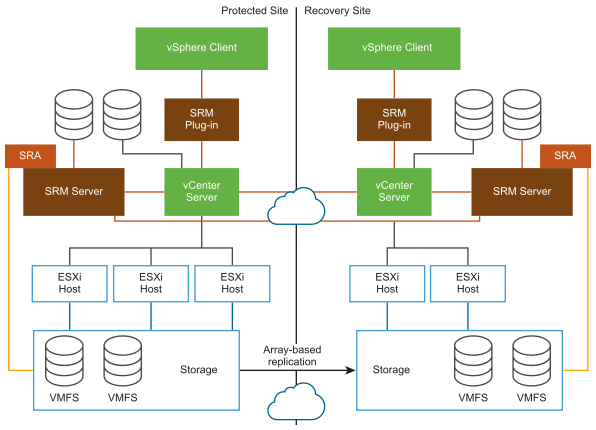When you use array-based replication, one or more storage arrays at the protected site replicate data to peer arrays at the recovery site. With storage replication adapters (SRAs), you can integrate VMware Live Site Recovery with a wide variety of arrays.
To use array-based replication with VMware Live Site Recovery, you must configure replication first before you can configure VMware Live Site Recovery to use it.
If your storage array supports consistency groups, VMware Live Site Recovery is compatible with vSphere Storage DRS and vSphere Storage vMotion. You can use Storage DRS and Storage vMotion to move virtual machine files within a consistency group that VMware Live Site Recovery protects. If your storage array does not support consistency groups, you cannot use Storage DRS and Storage vMotion in combination with VMware Live Site Recovery.
You can protect virtual machines that contain disks that use VMware vSphere Flash Read Cache storage. Since the host to which a virtual machine recovers might not be configured for Flash Read Cache, VMware Live Site Recovery deactivates Flash Read Cache on disks when it starts the virtual machines on the recovery site. VMware Live Site Recovery sets the reservation to zero. Before performing a recovery on a virtual machine that is configured to use vSphere Flash Read Cache, take a note of virtual machine's cache reservation from the vSphere Client. After the recovery, you can migrate the virtual machine to a host with Flash Read Cache storage and manually restore the original Flash Read Cache setting on the virtual machine.
Storage Replication Adapters
Storage replication adapters are not part of a VMware Live Site Recovery release. Your array vendor develops and supports them. You must install an SRA specific to each array that you use with VMware Live Site Recovery on the VMware Live Site Recovery Server host. VMware Live Site Recovery supports the use of multiple SRAs.
